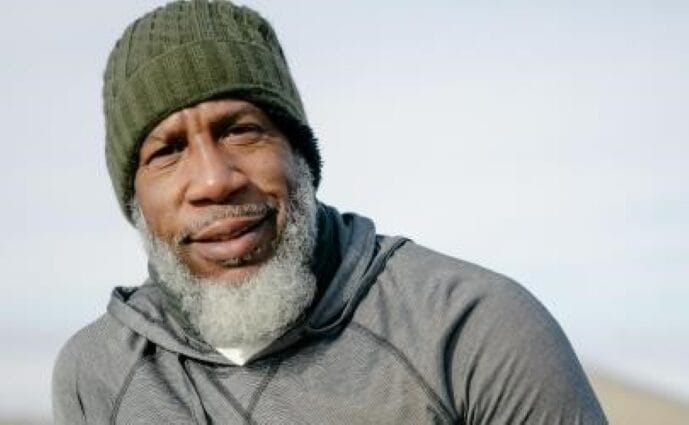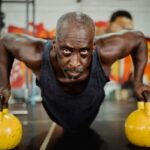While we may all feel we are experts at breathing since we do it so often, we don’t realize it becomes more difficult with age. Naturally our lungs lose strength, habits change and harden, and overtime stress begins to impact the way we breathe. As our breathing gets worse with age it impacts our health. It greatly reduces oxygen delivered to our cells, drains our energy and makes it more difficult for our bodies to recover from the wear and tear of daily life.
You can fix your breathing and reverse the impact dysfunctional breathing has had on your health. With active nasal breathing exercises and new healthier habits you can restore your natural breathing capacity and feel more alive and energetic. This article shows why breathing gets worse with age and how to make changes to reverse it.

Why Breathing Gets Worse With Age
There are a few changes that happen as you get older that impact your breathing efficiency.
- Loss of lung elasticity – Lungs naturally get stiffer with age, reducing their ability to expand and contract. This limits air exchange and lowers overall capacity.
- Weaker respiratory muscles – The diaphragm muscles lose strength without training, making each breath feel more difficult
- Changes in posture – Years of sitting and slouching compress the chest cavity, leaving less room for the lungs to work.
- Narrowing of Nasal airways – Aging can reduce airflow through the nose, especially if not used regularly for breathing, pushing more people toward mouth breathing permanently.
- Stress and poor breathing habits – Chronic stress leads to shallow, fast breathing. Over time, this becomes the normal pattern of breathing, causing the body to strain for breath.
- Declining CO₂ tolerance – Many adults lose the ability to tolerate normal carbon dioxide levels due to over-breathing. Lower tolerance to carbon dioxide creates breathlessness, fatigue, and reduced stamina [1].
These changes combine to make everyday activities feel more difficult, while also reducing oxygen delivery to your body where it is most needed..

The Hidden Costs of Declining Breathing
As your breathing gets worse with age, its not just your lungs that are impacted. Your entire body is affected, impacting how you feel each day.
- Less oxygen delivery – Muscles tire faster, and the brain has difficulty focusing and staying clear of brain fog.
- Poor sleep quality – Shallow breathing, snoring, or sleep apnea impact your sleep and block your body’s ability to recover.
- Higher health risks – Inefficient breathing causes strain on the heart, raising blood pressure, and weakening the immune system’s defenses.
- Accelerated aging – Non-functional breathing impacts your entire health. Poor breathing causes poor sleep. This leads to greater fatigue, slower recovery, and reduced vitality, all of which ages you faster.
Strong, efficient functional breathing not only makes your life better, easier, and healthier it is the foundation for long-term health, vitality and resilience.
How to Reverse It – Practical Fixes
You can retrain your breathing and regain your strength with consistent habits:
- Practice nasal breathing – It filters air, supports more efficient oxygen delivery, and prevents over-breathing.
- Strengthen your diaphragm – Use simple breathing exercises to strengthen your diaphragm.
- Fix your posture – Straighten your posture to allow more air to enter your lungs.
- Stay active – Walking and exercise strengthen and improve your lung capacity..
- Manage stress – Slow, light, nasal breathing calms the nervous system, helping to reduce un-needed cortisol in you system.
- Learn to tolerate CO2 – Slow nasal breathing with practiced breath holds, while at rest or while walking or jogging, will increase CO2 tolerance. This in turn helps with oxygen delivery to your brain and body [2].
Together, these adjustments improve your lung capacity and rebuild its efficiency reversing the impact of years decline.

Daily Breathing Habits to Adopt Now
There are simple things you can do to improve your breathing. Like anything, don’t expect fast results – spend the time to improve your breathing and it will improve your health.
- Start with short drills – Spend 5–10 minutes on slow active (as opposed to passive) nasal breathing exercises each day while meditating on your breath. This clears your mind, adds mental clarity and helps establish a habit. Learn more in Active Breathing for Better Health.
- Walk with control – Start by taking walking breaks where you keep your breath light, steady, and through the nose. After a couple of weeks try holding your breath for 3 to 5 steps after an exhale, followed by two normal breaths in and out through your nose. Repeat for the duration of your walk. Over time, this improves stamina and CO₂ tolerance.
- Create a bedtime reset – Use calm, gentle nasal breathing before bed to ease stress and prepare for deeper sleep. To ensure a better chance of maintaining nasal breathing, sleep on your side, not your back. After a few weeks of nasal breathing throughout the day, consider taping your mouth while you sleep to encourage nasal breathing.
- Check your posture often – Pull back your chest, push back your shoulders, and sit straight to give your lungs room to expand. One of the best ways to improve your posture is to lift weights – overhead presses, lat pulls (or pull ups), bench presses (or pushups), and squats and leg lifts. Increase the amount of weight used over time. Or avoid weights altogether and use resistance bands – they are safer and more convenient..
These simple routines build consistency. When practiced daily, they restore lung capacity, sharpen focus, and give you steady energy to carry you through the day.
Conclusion: Why Your Breathing Gets Worse with Age
While your breathing will change with age, it doesn’t have to get worse. Being aware there is a problem and taking steps by fixing your breathing will help restore your health. Like most things, you don’t need to make drastic changes to make a difference. Usually with big changes, it is difficult to sustain improvement. Try focusing on simple and small changes which turn into lasting habits over time. Small changes allow for lasting improvements.
Take control of your breath now, and you’ll move, think, and recover with the strength and vitality you need for the years ahead.
Check out What Functional Breathing Actually Means.







